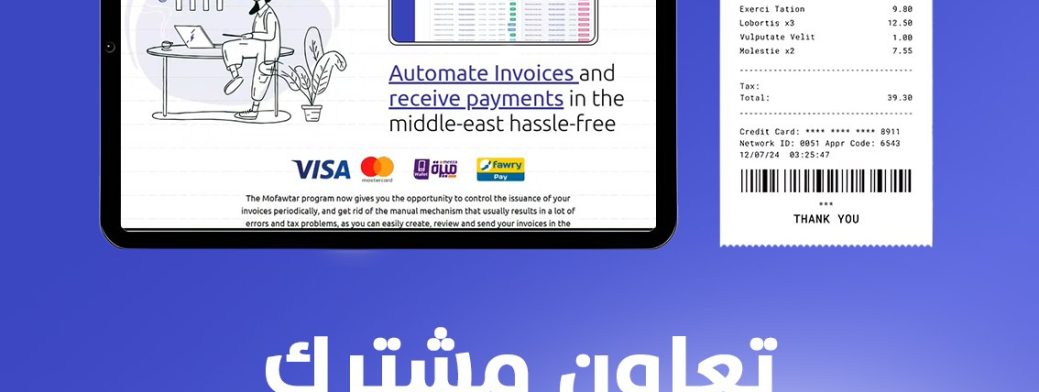With the shift toward digital transformation, electronic invoices and electronic receipts have become essential tools for organizing financial transactions and ensuring transparency. Below are the most frequently asked questions about them and their answers.
1. What is an electronic invoice?
An electronic invoice is a digital document issued and approved electronically. It certifies a transaction between a seller and a buyer and includes all traditional invoice details such as:
- Supplier and buyer names.
- Tax identification number.
- Details of products or services.
- Total value and taxes.
2. What is an electronic receipt?
An electronic receipt is a digital document used to record retail sales or service transactions with direct customers. It aims to document all dealings with non-registered taxpayers (consumers).
3. What is the difference between an electronic invoice and an electronic receipt?
- Electronic invoice: Directed toward companies or tax-registered clients.
- Electronic receipt: Directed toward end consumers (non-tax-registered individuals).
4. What are the benefits of using electronic invoices and receipts?
- For the government: Improves transparency, combats tax evasion, and increases revenues.
- For businesses: Simplifies accounting processes, reduces manual errors, and enhances financial records.
- For consumers: Ensures their rights with documented transaction records.
5. Are electronic invoices and receipts mandatory?
Yes, according to the Egyptian Tax Authority’s regulations, electronic invoices and receipts have become mandatory for all businesses and commercial activities in a phased implementation.
6. How can businesses register for the electronic invoicing system?
- Obtain an electronic signature certificate from an accredited provider.
- Register on the electronic invoicing portal via the Tax Authority.
- Configure the accounting system to issue invoices in XML or JSON format.
7. Does the electronic receipt require an electronic signature?
No, electronic receipts do not require an electronic signature but are sent directly to the Tax Authority’s portal for registration.
8. What are the technical requirements for using electronic invoices and receipts?
- An accounting system compatible with the system requirements.
- Internet connection.
- Electronic signature certificate (for invoices only).
- API integration to connect the system with the Tax Authority.
9. How is an electronic invoice issued?
- Prepare the invoice using the company’s accounting system.
- Verify the accuracy of the data and format it in XML or JSON.
- Sign the invoice electronically and send it to the Tax Authority’s portal.
10. How is an electronic receipt issued?
- The receipt is generated from a point-of-sale (POS) system or a similar system.
- It is automatically sent to the Tax Authority’s portal via API integration.
11. What are the penalties for non-compliance with electronic invoicing or receipts?
- Financial fines.
- Suspension of the tax file.
- Restrictions on government transactions.
12. Can an electronic invoice or receipt be modified after issuance?
- A credit or debit note can be issued to correct any errors.
- The corrections must be sent to the Tax Authority for approval.
13. What steps should businesses take to prepare for electronic invoicing and receipts?
- Train employees on using the new systems.
- Update accounting systems to ensure compatibility.
- Obtain an electronic signature certificate.
- Integrate systems with the electronic tax portal.
14. Does the Tax Authority provide support for businesses implementing the system?
Yes, the Egyptian Tax Authority offers:
- Workshops and training sessions.
- Educational guides and tutorials on its website.
- Technical support through dedicated communication channels.
15. What are the approved formats for electronic invoices and receipts?
- Electronic invoices: XML or JSON formats.
- Electronic receipts: Generated by the system and sent directly via API.
16. Can external accounting software be used to issue invoices?
Yes, as long as the software is compatible with the Egyptian Tax Authority’s requirements and supports API integration.
17. What is the UUID in electronic invoices and receipts?
The UUID (Universally Unique Identifier) is a unique number assigned to each electronic invoice or receipt to ensure non-duplication and transaction verification.
18. How does electronic invoicing affect tax returns?
Electronic invoicing simplifies the preparation of tax returns by providing an accurate and documented record of all transactions.
Conclusion
Electronic invoices and receipts represent a significant advancement in Egypt’s tax management system, offering benefits such as enhanced transparency, reduced errors, and secured rights for all parties. Compliance with the system contributes to improving the business environment and achieving sustainable development.
